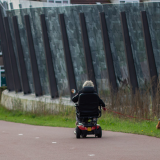
Javne storitve
Javne storitve, kot so zdravstvo, izobraževanje, socialno varstvo in prevoz, so bistvene za dosego visokih ravni socialne zaščite, socialne kohezije in socialne vključenosti. Odločilna dejavnika za njihovo učinkovitost v spreminjajočem se družbenem in demografskem okolju sta kakovost storitev in dostop do njih.
Izziv za oblikovalce politik je zagotoviti zasnovo in izvajanje zdravstvenih in socialnih storitev, ki izpolnjujejo različne potrebe državljanov. Navedeni izziv še stopnjujejo zelo velike finančne omejitve v zadnjih letih in vse večje povpraševanje, ki je deloma posledica staranja prebivalstva, deloma pa tudi prihoda beguncev v Evropo. Poleg vprašanj cenovne dostopnosti in kakovosti se pojavljajo tudi nova vprašanja. Med njimi so tveganje, da bi lahko novi digitalni kanali za opravljanje storitev izolirali že tako prikrajšane skupnosti, in morebitne težave pri zagotavljanju standardov dostopa do storitev in njihove kakovosti.
V svežnju Evropske komisije o socialnih naložbah, ki je bil predstavljen leta 2013, so države članice pozvane, naj več pozornosti namenijo visokokakovostnim javnim storitvam. Poleg tega je v strategiji Komisije za enotni digitalni trg, sprejeti leta 2015, poudarek na posodobitvi javnih storitev kot načina za spodbujanje konkurenčnosti. Sprejemanje novih tehnologij, spletne javne storitve in čezmejna interoperabilnost so bistveni za izboljšanje stroškovne učinkovitosti in kakovosti storitev. Komisija je aprila 2017 predstavila sveženj evropskega stebra socialnih pravic, ki med glavnimi načeli vključuje dostop do kakovostnega izobraževanja, predšolske vzgoje in varstva, zdravstvenega varstva, socialnih stanovanj in drugih bistvenih storitev.
- Evropska komisija: Sveženj o socialnih naložbah
- Evropska komisija: Enotni digitalni trg
- Evropska komisija: Evropski steber socialnih pravic



























